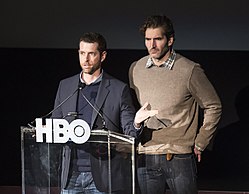Production
Writing

"The Ghost of Harrenhal" is the fifth episode of the second season written by the two showrunners David Benioff and D.B. Weiss, and the fifteenth in the whole series. The script is based on the chapters Daenerys II, Arya VII, Catelyn IV, Jon IV, Bran V, Catelyn V, and Jon V (28, 31, 34, 35, 36, 40, and 44) from George R. R. Martin's A Clash of Kings . Tyrion's scenes with the Pyromancers and Cersei are taken from the chapters Tyrion V and Tyrion VIII (21 and 37). [1]
There are numerous divergences from the source material: in the books Lord Baelish is sent by the council to negotiate with the Tyrells only after Renly is dead; Theon's departure from Pyke is not shown, and Dagmer Cleftjaw is a scarred old master-at-arms who is fond of Theon because Cleftjaw trained him when Theon was a boy; Arya is a scullion instead of a cupbearer and is not able to interact with Lord Tywin; and the character of Xaro Xhoan Daxos has been drastically changed making him a black heterosexual of humble origins and giving him a vault that is never mentioned in the books. [1]
Casting
The episode introduces the character of the pyromancer "Wisdom" Hallyne, played by the British actor Roy Dotrice. Dotrice is a personal friend of George R. R. Martin, since the two met while working on the 1980s hit TV series, Beauty and the Beast (Martin as a producer, and Dotrice playing "Father"). Years later, Dotrice was Martin's choice to read the audiobooks of A Song of Ice and Fire, a work that brought Dotrice a Guinness World Record for the largest number of characters voiced in an audiobook. [2]
After the series was greenlighted, Martin wanted to involve Dotrice, suggesting Maester Aemon, Rodrik Cassel or Grand Maester Pycelle as possible roles. [3] He was eventually cast as Pycelle, [4] but he had to withdraw from the show for medical reasons and Julian Glover was cast to replace him. [5] In the second season, with his health recovered, he was given the role of Hallyne. [6]
Other characters introduced in the episode are the Night's Watch ranger Qhorin Halfhand, played by Simon Armstrong, and the mysterious Quaithe, played by the German actress Laura Pradelska. This is also the first episode in which Pyat Pree (briefly seen standing in Episode 4) has any lines.
Filming locations
The episode's interior shots were filmed at The Paint Hall studios, close to Belfast, where the main sets are located. Also in Northern Ireland were filmed the scenes at Harrenhal (in a set built near Banbridge) and Pyke (at the port of Ballintoy). Renly's camp was once again filmed on the country's northern coast.

After having filmed the Night's Watch storyline beyond the Wall in Northern Irish forests for the first four episodes of the season, the producers decided that the unexplored land further to the north would be filmed in Iceland. According to the creator George R. R. Martin's vision of the setting, "the area closest to my Wall is densely forested (...). And then as you get further and further north, it changes. You get into tundra and ice fields and it becomes more of an arctic environment. You have plains on one side and a very high range of mountains on the other." [7]
Co-Producer Chris Newman said that until then they had been able to reproduce the lands north of the Wall by adding artificial snow, but now they needed a bigger landscape. According to David Benioff, they always "wanted something shatteringly beautiful and barren and brutal for this part of Jon's journey, because he's in the true North now."
To represent the Frostfangs and The Fist of the First Men, the production filmed at the glacier at Snæfellsjökull, and also at the glacier of Svínafellsjökull in Smyrlabjörg and the hills of Höfðabrekkuheiði (near Vík). [8]

The other main location introduced in the episode was the gardens of Qarth, which were filmed at the Benedictine monastery of the Croatian island of Lokrum. The abandoned monastery was built in Gothic-Renaissance style in the 15th century.
The island of Lokrum is only 680 metres offshore from Dubrovnik, the location used for King Landing's exteriors, and can be reached by boat in 15 minutes. Coincidentally, Lokrum shares with its fictional counterpart of Qarth having peacocks among its distinctive features: Lokrum is inhabited by families of peacocks that were introduced to the island in the 19th century by the Austrian archduke Maximilian. [9]